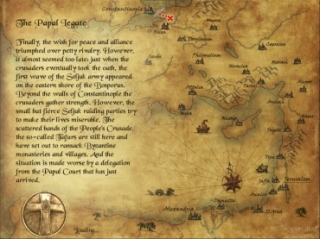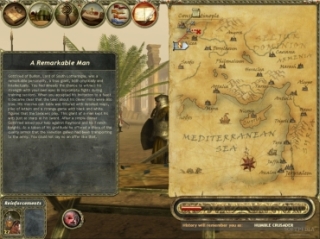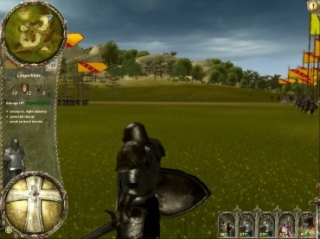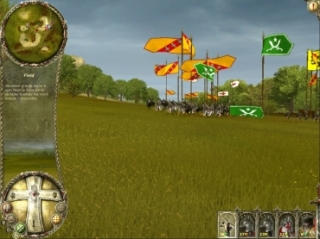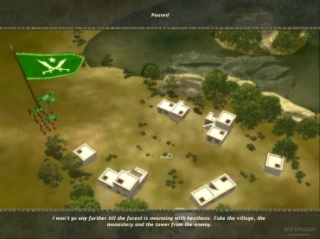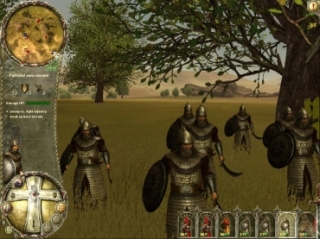Crusades were bloody affairs, where the mailed knights of Europe faced off against the lightly armored fast footed Seljuks and Saracens, where great devastation was inflicted upon cities and where innumerable acts of valor spawned ballads and epics that featured at the core of the chivalric ethos for hundreds of years afterwards. The same Crusades make for a very good and under-exploited setting for videogames. Tactical combat oriented real time strategy games with a story driven campaign, to be more precise. Seeing this opportunity, developer Neocore Games, hailing from Hungary, have created Crusaders: Thy Kingdom Come, a game that puts you in the metal boots of one of five European knights and leaders of men as they try to make a name for themselves in the Crusade.
Story
The year is 1095 and Pope Urban has just called for the first Crusade. The appeal originated with Alexei I, emperor of the Byzantine Empire, that was under attack by the Seljuk Turks and had suffered a serious military setback at Manzikert. The Pope and the Western figures that answered the call saw the Crusade as a good way of pushing Christian interests in the Middle East and of regaining the most sacred city of the Christians, Jerusalem. To chants of "Deus Vult!", both knights with their retinues and humble peasants took up arms and marched towards Constantinople and then towards Jerusalem. Even if the Crusades proved to be failures in their entirety, both militarily and politically, for the West, the First Crusade was quite successful. The armies of Christianity sieged and captured Jerusalem and the Crusader States were established.
The game does not offer the now classic Total War formula of a turn based layer which augments the real time battles. It takes up the linear campaign as the core mechanic, with the hero using units in tactical engagements while a (rather beautiful) 2D map marks the progress that the crusaders make towards the Holy City of Jerusalem.
There are 5 different heroes you can play as, belonging to 5 different factions implicated in the Crusades. The only slightly ahistorical appearance here is that of a Spanish hero, Pedro Luis Cativiela, who fights in the army of Provence. Other than that, you have Godfrey of Toulouse, the noble French knight, Lothar of Aachen, the savvy politician from the Holy German Empire, Roger of Hastings, the mercenary with an abysmal reputation, and Roberto of Naples, the Norman hailing from the South of Italy. The player can choose one of the heroes and enjoy a slightly different perspective on the conflict. Each of them also keeps a journal of the events, which ads some much needed back story to the game.
The events are modeled after the events of the First Crusade, with a good grasp of actual history and with the player visiting most of the more important battles. The issue is that you only get to command so many units in the tactical battles so the fights (with maybe the exception of the final ones) never seem truly epic, but more like sideshows to the Crusade itself. Given the fluid nature of the First Crusade and the numerous skirmishes fought, there's no accuracy to these limited scale engagements, so some players might be disappointed by the lack of "epic" combat.
GameplayThe real time tactical engagements of Crusaders: Thy Kingdom Come are well engineered. Terrain is important, as it can drastically reduce the effectiveness of your army through fatigue. Formations, from a shield wall to the anarchic mob, are used to enhance the fighting abilities of various regiments or to protect them from archer fire. Elevation is important in choosing where you want to fight and gives archers a few considerable advantages, both in range and, as I witnessed it, in damage. Spearmen really make short work of cavalry while heavy infantry, with the right formation and full stamina, will overpower pretty much everything on the field. Scrubs and forests make for perfect ambush locations and there have been times when my general was caught well ahead of his army and quickly slaughtered. The pace is quite fast and most objectives require a bit of tactics to be achieved (try going for the harder secondary objectives rather than for the easier ones).
The thing that makes Crusaders: Thy Kingdom Come more than just a liner campaign of interesting but not extraordinary tactical engagements is the interval between battles. Prior to each mission, you get to visit the Crusader camp, where you can tweak your strategy and enhance your soldiers. There's a training ground where you can hire more troops (using the gold that you get by successfully completing objectives) and an armory where you can buy better gear for your troops. You also have access to an altar where you can equip or donate various religious artifacts that you acquire in the campaign and you can check out the attitude that the various elements of the Crusade army have towards you. As you gain standing with each faction, you get various bonuses, from better units to choose from to more experience gained in battle. There's also the journal section I talked about, which also tracks your progress a crusader.
The options presented in the camp are not extraordinary by themselves, but rather because of the way they combine with the variety of the factions and heroes to make the game a very replayable one. Lothar of Aachen and Godfrey of Toulouse bring very different options and units to the table and I, for one, looked forward to tackling the same tactical challenges with very different means. The way you can customize your troops, granting them captains, buying better armor and weapons, activating different abilities that come with rank gained through experience, make for a more diverse and complete game than it seems at first sight. There's real depth to Crusaders: Thy Kingdom Come.
Visuals and audioThe game boasts epic battlefields and extremely engaging visuals. It delivers, but not in the manner that the most recent Total War does, for example. Units look good, especially when zoomed in to the max, but all the members of the unit look the same, which is a bit of a drag after the variety of faces, equipments and moves exhibited in Medieval 2. But most of the time you'll be zoomed out to the max, taking care of the larger business of winning battles, so it's not that big of a deal. With the minimap and the eagle eye's view, it's easy to know who's who, where your objectives are what your units are doing. There are times when changing your view with the keyboard feels a bit to fast, but you can easily compensate with the mouse.
The battlefields look nice, although the various towers and villages that dot the landscape feel like something added at the last minute to make the game playable. And there's something gratifying in seeing the various units clash with enemies that just broke cover to rush to your general.
The sounds are more of a miss than a hit, unfortunately. The music is pretty standard and does get old quite fast (I played with an assortment of heavy metal and Gregorian choruses in the background) while the sounds of the fight are oddly missing at times.
This is Neocore's first effort and, at times, it shows. While the basic gameplay is solid, they really need to pay a bit more attention to the finer points of presentation for their next games. I'm the sort of gamer that values gameplay and fun over pretty graphics and ambient sounds, but the market these days is very demanding when it comes to presentation.
And then there's the issue of the crashes. I've been having a lot of them even though I've swapped around 4 versions of Nvidia video drivers and tweaked the game options. It might be an issue with my machine, but I can't really say for sure as the developers don't have a support forum for the game.
Multiplayer
There's a dedicated LAN games component in the game, with a different shortcut than the singleplayer component and the game should lend itself nicely to competitive multiplayer games. It would have been nice if the developers had included some historical battles on which to test your skills against other human players.
While the LAN component is decent, the Internet games seem to be suffering from the worst symptom there is: a lack of players. Better convince some friends to tag along if you want multiplayer action.
ConclusionIt certainly isn't the best wargame around. The scope of Medieval 2: Total War dwarfs the efforts that Neocore Games have put into Crusaders: Thy Kingdom Come. But the game has variety and a coherent mechanic. There's method to the way you progress through the campaign and there's clearly merit in the way the game focuses on the First Crusade and in the way it simulates as much of the historical elements as possible. The camp options are really interesting and make for variety even if the 15 single player missions are not extremely varied. I got attached to my heroes as I fought my enemies, upgraded my troops, hired more powerful Crusaders and then saw my rank progress in the Journal tab.
 14 DAY TRIAL //
14 DAY TRIAL // 
